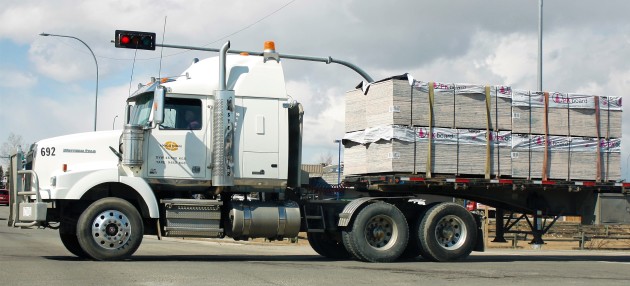Reduced speed zone ahead
SALMON ARM, B.C. – A group of concerned B.C. residents is hoping to slow down commercial vehicles passing through their city.
Jim Kimmerly, chairman of Plan4Prosperity, said commercial traffic has long been an issue in the Shuswap community of Salmon Arm, with an estimated 1,500 trucks going through the downtown area every day.
“Most of the drivers are good and take precautions while passing through,” said Kimmerly, “however, there are too many that do speed and run red lights.”
One such incident occurred in December 2016, when a semi-truck ran a red light on the Trans-Canada Highway and collided with a bus.
Kimmerly said there have been several of these types of occurrences involving semi-trucks, some including fatalities “where the commercial drivers were at fault.”
Kimmerly pointed to a survey conducted two years ago by the Salmon Arm Chamber of Commerce that looked at two intersections along the Trans-Canada within the city measuring speeding and red-light running commercial trucks.
The survey found that on average there are 15 violators per day, a number Kimmerly believes is a conservative estimate.
“Salmon Arm has eight traffic lights from the west to east side of town, so we know that the number of infractions is much higher,” he said. “The reason for the focus on large trucks is because of the level of damage that can result if something goes wrong.”
Lowering the maximum speed a commercial vehicle can travel through the city to 40km/hr. is one way Kimmerly and his group believes would address this safety issue. The current speed limit for all vehicles is 50km/hr.
Plan4Prosperity has also suggested that commercial traffic be relegated to the right lane of the highway, a move Kimmerly said would help eliminate some of the jockeying for position some truck drivers do while passing through town.
“It’s the lower speed for the trucks that will give the drivers a better chance of avoiding an accident and limit the level of damage if an accident does occur,” said Kimmerly. “It is rare that we have a major incident involving cars in the downtown area.”
Dave Earle, president and CEO of the B.C. Trucking Association (BCTA), said though all association members are committed to road safety, some drivers and companies can lose their focus.
“The story of trucks moving through communities at inappropriate speeds is thankfully becoming increasingly rare,” said Earle. “However, in our view, decreasing a speed limit which is not currently being obeyed does little to slow vehicles down.”
Earle said a more effective way to ensure drivers adhere to traffic laws is to increase enforcement of existing limits, both by local authorities and Commercial Vehicle Safety and Enforcement (CVSE).
Kimmerly, who is a former commercial truck driver himself, said his group’s effort is not about discriminating against commercial drivers, but rather an effort to increase public safety.
And it’s not just about the incidents that result in a collision, according to Kimmerly, but also the close calls that do not get reported about.
“This most often happens at a traffic controlled intersection as the light turns green,” said Kimmerly. “Many of us have learned that a green light does not mean go, it means look both ways first because if you don’t you could be a hood ornament on a semi.”

So far, the local council has not reacted to the reduced speed limit suggestion from Plan4Prosperity, and Kimmerly said he does not expect that will change any time soon.
“The municipal elections are about five months away,” Kimmerly told Truck West April 17, “and this will be an election issue that the residents of Salmon Arm will use in considering the next council.”
Kimmerly said the most desirable option for Salmon Arm would be to have a bypass around the city, which would reduce the overall amount of traffic passing through, but that could be a long ways away.
“Until then, we need to do what we can to slow down the large trucks passing through town,” he said. “The risk of injuries or fatalities is too high and nobody wants to see more of that.”
Have your say
This is a moderated forum. Comments will no longer be published unless they are accompanied by a first and last name and a verifiable email address. (Today's Trucking will not publish or share the email address.) Profane language and content deemed to be libelous, racist, or threatening in nature will not be published under any circumstances.